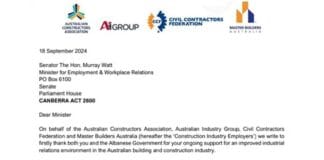Up to 20,000 union members went on strike at Australia Post in December, part of a pre-Christmas rush of strikes that also hit Sydney buses, Telstra and Qantas. MUA members in the Western Australian offshore oil and gas fields also went on strike.
Post workers are fed up with management’s efforts to slash costs by cutting full-time staff and screwing more out of its workers.
Workers held a nationwide 24-hour strike in mid-December, followed by further stop work action just before Christmas which included another 24-hour strike in most states.
Australia Post has declared war on the union, claiming they would dock a day’s pay for any work bans including wearing union badges to work or sitting down on the job.
Management was outraged at the union’s popular “free Christmas mail” pledge, where post workers promised to deliver mail posted without stamps for free.
The strikes at Australia Post have been a long time coming. For years management has been slashing working conditions and shedding staff.
“We are forced to work fast to meet unrealistic times and it is dangerous”, Australia Post employee Julie told Solidarity at the picketline at Melbourne’s Preston delivery centre.
“Australia Post does what it likes these days, directing injured workers to company doctors, who usually send them back straight back to work”.
This is not a dispute about pay—it is about maintaining fair working conditions and making sure there are controls on management to stop them slashing full-time jobs and conditions in future.
But union officials at Australia Post have been hesitant about calling the kind of strike action necessary to win the dispute.
Management has been stalling on negotiations for over two years since the last post enterprise agreement expired.
Yet the union officials were only prepared to implement ineffective “work bans” on particular activities, such as the ban on checking for stamps on Christmas mail. They only called strikes when Post management announced they would dock workers four hours pay—effectively penalising workers for a half-day strike—if they were caught carrying out any work bans.
Even then they were terrified that strikes so close to Christmas might put the public offside and made sure that strike action halted to allow Christmas mail to go through—undermining the effectiveness of the action.
Yet a fight to reverse the cutbacks could win widespread support if the union made it clear the campaign is also about winning better services for the public.
Since Christmas the union officials have called no further action and are back to trying to negotiate with management—using the excuse that a new CEO may mean the company takes a different approach.
Step up strike action
But the strike action has clearly hurt Australia Post bosses. The highlight was at Melbourne depots where pickets at Dandenong, Melbourne Airport, Geelong and Ardeer stopped trucks going into the centres.
Australia Post resorted to flying in five loads of mail to Dandenong delivery centre by helicopter!
Post workers have waited too long already for management to come to the table.
It’s clear management will only concede fair conditions if they are hit hard with continuous days of strike action that hold up mail delivery and cost them money.
By James Supple





